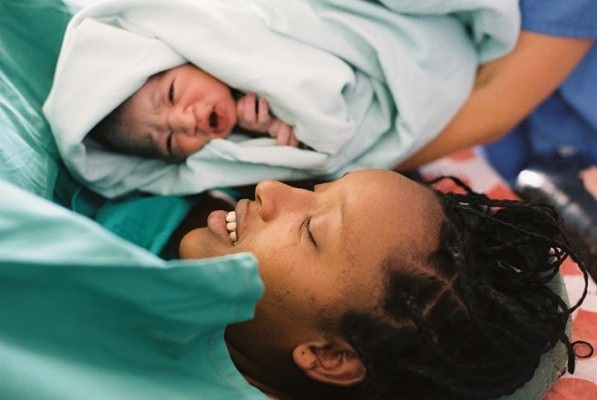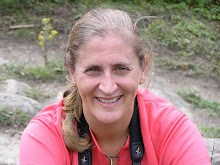February 28th
Believe it or not Friday was another public holiday in Ethiopia (3 in my stay so far & another on tuesday)-it was a Muslim holiday, most people seem to think that it was to celebrate the birth of Prophet Mohammed but no one is absolutely certain and my Bradt guide has failed me as for once this holiday is not listed. That a predominantly Orthodox Christian country should have Muslim public holidays is a testament to the apparent peaceful co-existence of Muslims and Christians here with no evidence of any of the cultural tensions sadly so common in more developed countries.
This holiday meant that there was no outpatient clinic to occupy my time in the morning and there were no women in labour either so I decided it was time to force a tidying of the labour & delivery room (Mark knows to his cost that leaving me with unexpected time on my hands is likely to prompt me to embark on some sort of "clear out" exercise). The lack of resources results in a reluctance to throw anything away which is laudable until the place is so full of items saved for a "rainy day" that finding the things you actually need becomes difficult (and obviously in a hospital such items can become an infection hazard). There were a number of things that in spite of extensive enquiry no one could remember (if they ever knew) the function of, there were drugs & other packaged supplies that had expiry dates in the last century (in a country like Ethiopia there are reasons to be flexible in such matters but never with drugs that could become ineffective and even for other items there are limits!) and in addition to these things there were large numbers of stored empty boxes (just in case). I'm not absolutely sure what the midwives thought of the whole exercise (eccentric "Faringe" most likely) but they went along with it and only a few items that I threw away were retrieved from the bin!
Laundry is another area that was very chaotic in the delivery room and I felt a bit like Florence Nightingale must have, as I insisted that everything was pulled out of the cupboards prior to being sorted, folded and then being returned to the cupboards in orderly piles- allowing things to be found more easily. Unfortunately this order also made it much more obvious what a severe shortage there is of linen there is as folded neatly it looks a lot less. I use the term linen very loosely- it compromises: 1) large plastic aprons (for the midwives and doctors to wear to save their scrubs or clothing during delivery- rarely with both neck band and ties but I have learned how to tie an apron very effectively with only a single string), 2) a very small number of gowns for women who require caesarean section (fortunately we rarely do more than 3 per day), 3) plastic aprons now devoid of any strings that will serve on for anything requiring a waterproof sheet (with a selection of other plastic "tarpaulins"), 4) pieces of sheeting (we might also use the term rags!) in a variety of sizes that are multi-purpose from wrapping babies after delivery, to cleaning mothers or surfaces or more rarely as a dignity cover for a mother- these are all carefully laundered in spite of the fact that some of them have more hole than cloth! and finally 5) rectangular pieces of thick plastic that are used to cover the delivery beds. Describing this I realise how much I have moved on as when I first arrived the bleakness of these items was shocking but 2 months on I realise that although newer & less thread-bear items would be nicer, patients care is not materially affected by them as they are carefully, regularly and well cleaned The stationary supply was also in chaos with a shortage of the items we use on all women and massive overstocking of items we use rarely (I can only conclude that someone enjoys photocopying). I was able to take 300 proformas for observation of women undergoing induction of labour to the Maternity Worldwide storeroom on the basis that we have induced no more than 10 women since I arrived at the hospital (5 years stock in circulation seems excessive).
So at the end of our efforts the delivery room is much more orderly with everything in an appropriate place- of course it now remains to be seen how long it will stay this way!
I was about to go for lunch when our first labouring woman of the day arrived. As is so often the case she had travelled from far and had been in labour since the previous evening. This was surprising (and immediately worrying) as it was her 6th baby- with her five previous children having been born normally at home. The baby was alive with a normal heart-beat (as ever against the odds) and on feeling her abdomen it was unusually difficult to tell which way around the baby was, so I immediately assessed her internally and for a moment thought that she had a breech (bottom first) baby in advanced labour. However it didn't feel quite right and I realised that it was not a foot but a hand and not buttocks but the shoulder of the baby that I could feel. I hope that even the non-medical readers will be able to appreciate that a baby trying to exit shoulder first is not good- it being technically impossible & possibly causing the uterus to rupture as the labour is obstructed but the contractions remain very strong trying to overcome the obstruction (a bit like squeezing a toothpaste tube hard with the top on). We moved quickly to do deliver the baby by a caesarean section- this proved to be one of the more difficult caesarean deliveries I have ever done as the baby was sort of folded in half (head and feet up and the arm & shoulder down- not a very comfortable position even for a flexible fetus) making it very difficult to effectively unfold in order to allow delivery through the incision. Anyway I managed to deliver a live girl with a bit of a struggle (happy to explain to the details at a future date to the initiated or interested), resuscitated her as she was very floppy at birth (not sure if I've mentioned that if the baby needs more help than the midwife is able to give I have to leave the operation mid-way and resuscitate the baby, returning to the mother when the baby is stable) and returned to the mother repairing a bigger uterine incision than is usual for a caesarean section but thankfully without further complication or excessive bleeding.
I hadn't really had chance to look at the baby in closely during the resuscitation as I was keen to get back to her mother as quickly as possible but immediately after I finished the operation the midwife asked me to look at her again. She had a hugely swollen arm (easy to explain as that had been the front bit that was being pushed down the birth canal) and swollen legs and one side of her face (less easy to explain but I think the result of being folded and squeezed for a number of hours). However these were not what was concerning the midwife- who had noticed a typical facial appearance. I examined her and agreed that she has features strongly suggestive of Down's syndrome. Thankfully her heart appears to be normal, she also rapidly established breastfeeding suggesting she doesn't have any of the bowel abnormalities and the initial floppiness (which can be a feature of Down's syndrome) seems not to be very severe. I was worried about the future for a child with such a significant handicap in an environment where even normal children seem to struggle to survive.
On the ward round next morning I asked the midwife if anyone had explained to the mother that I thought that her baby has Down's syndrome (no blood tests available to confirm here- so clinical suspicions have to be acted on). The midwife shrugged and said what did I want to tell her as there is no Oromifa word for Down's (not absolutely sure even the midwife knew what we were talking about although there is a Down's syndrome orphan in Gimbi town). In the end we agreed she would tell her that this child would be different to her other children, that would require everyone in the family to encourage her by playing with her and helping her to learn to walk and talk. The mother accepted this without question and it made me realise that I must not to make assumptions based on my views of the world as a citizen of a developed country: in a society where few people can read or write, where the majority of people will do manual work and the extended family is very strong- being born with Down's syndrome is not the same handicap as is in the UK.


Thank you Leonie for this incite into Ethiopia and more specifically what it is like for those born with Down's Syndrome in that country.
ReplyDeleteI am thankful this baby appeared not to have any of the heart problems so often associated with our babies as I cannot imagine that would give a good prognosis for it's future.
Penny Green
Down's Heart Group
www.dhg.org.uk